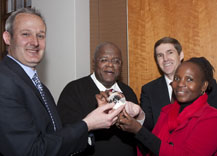Latest News Archive
Please select Category, Year, and then Month to display items
12 January 2024
|
Story Nonsindiswe Qwabe
|
Photo Sonia Small
 Since joining the UFS in 2008, Dr Grey Magaiza has worked extensively on approaches that can foster the socio-economic transformation of societies.
Since joining the UFS in 2008, Dr Grey Magaiza has worked extensively on approaches that can foster the socio-economic transformation of societies.
“The future should be one where communities can decide on their development agenda and futures. That’s the most important for me.” Dr Grey Magaiza, Deputy Director of the Centre for Gender and Africa Studies (CGAS) and Head of the Community Development programme on the Qwaqwa Campus, is passionate about capacitating communities to be agents of change and advancement. His vision for the future emphasises the empowerment of communities to take charge of their development by actively participating in decision making and the implementation of development projects that can improve their lives.
Since joining the UFS in 2008, Dr Magaiza has worked extensively on approaches that can foster the socio-economic transformation of societies. Over the years, he has crafted his research speciality into one that he is most proud of – being an interdisciplinary scientist immersed in the development of communities.
“I’m in a fortunate position of researching what I like. I say ‘fortunate’, because I’ve taken the time to understand what I’m passionate about, which is the overall field of rural livelihoods and livelihood futures – in short, community development. My research starts from an engaged university, understanding the elements that a university must use to enhance transformation and relevance to its immediate community in terms of development.”
One of the ways he has done this is by looking at social entrepreneurship as a development approach for young people in a rural setting. Through workshops with non-profit and civic organisations in Qwaqwa, Dr Magaiza has been helping these organisations to map out their needs and actively meet them through the involvement and support of external role players.
“We understand that communities are part of the national development agenda, but even that national agenda respects community knowledge and intentions and allows communities to shape their identity. A critical enabler of this is community organising. You bring back the capacity in communities to have dialogues on issues affecting them as spaces for engagement, knowledge exchange, and for people to just talk about their way forward.”
By enabling communities to define their development agenda, they can address their specific needs, challenges, and aspirations, he said. “When I look at livelihood futures, it’s quite an exciting aspect of my work – it’s like looking into a fortune tellers’ globe, because you’re not deciding for communities what they should do, but the communities themselves take those decisions.”
American diplomatic staff honoured
2012-07-11
 |
|
With Prof. Jonathan Jansen, Vice-Chancellor and Rector, are from the left, Mr Brian Denver, Ms Selaelo Ramoleta and Mr Earl Miller.
Photo: Hannes Pieterse
11 July 2012
|
The university has honoured a group of high-ranking staff members of the American Embassy in South Africa and Consulate in Johannesburg for their contribution to the university. Amongst them is the Consul-General, Mr Earl Miller.
Mr Miller and five colleagues were honoured for their outstanding contribution to transformation of the university. They are Mr Raymond Tripp, Chief Cultural Officer at the embassy in Pretoria; Ms Wendy Kennedy, Consulate Officer at the consulate; Mr Brian Denver, Cultural Officer at the consulate; Ms Selaelo Ramoleta, Cultural Officer at the embassy and Ms Melissa Clegg-Tripp, Public Affairs Officer at the consulate.
Prof. Aldo Stroebel, Director: International Academic Programmes in the Office of the Vice-Chancellor, says the university has been working with the staff of the embassy and consulate for years and that they receive recognition for their support.